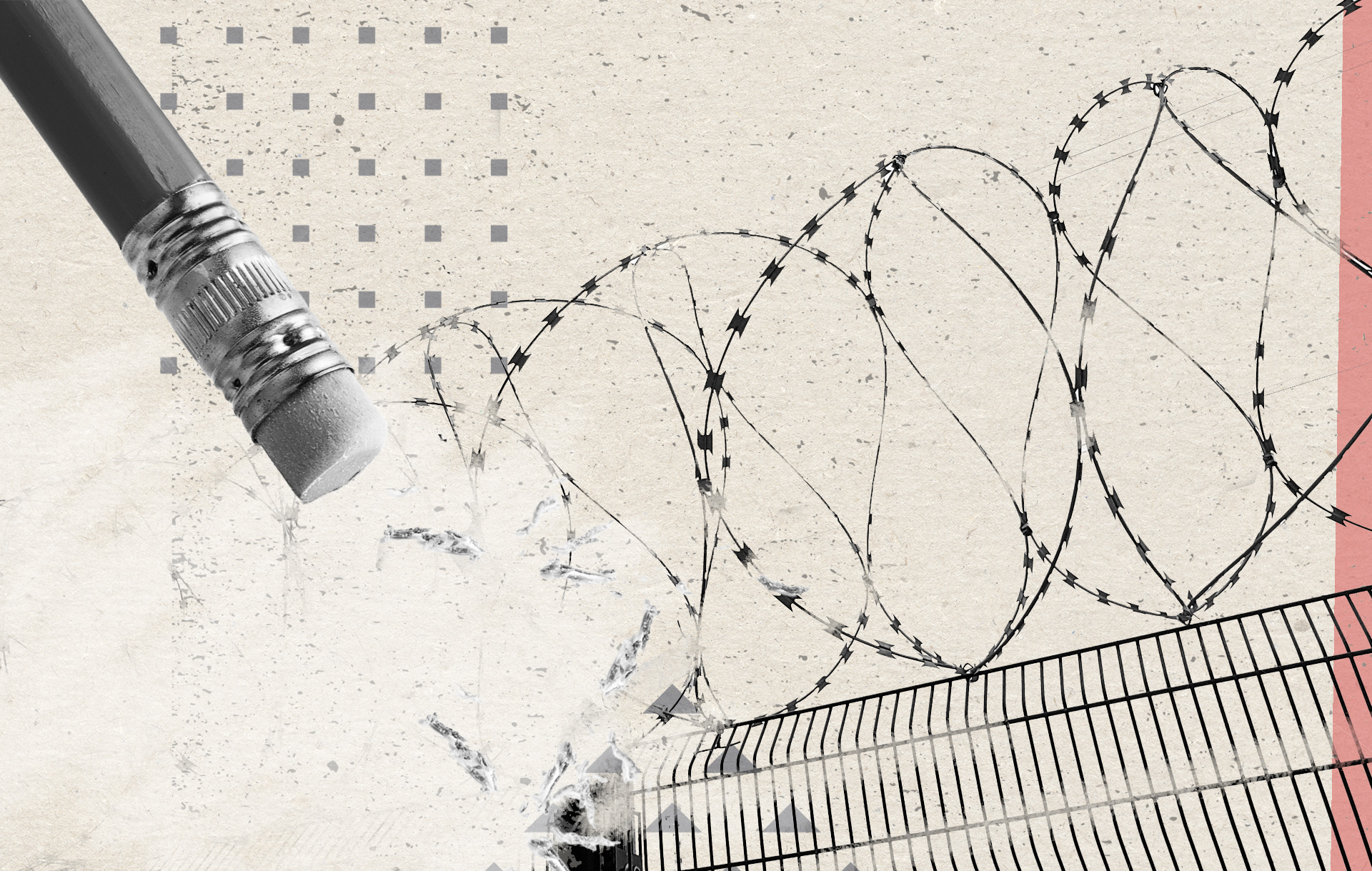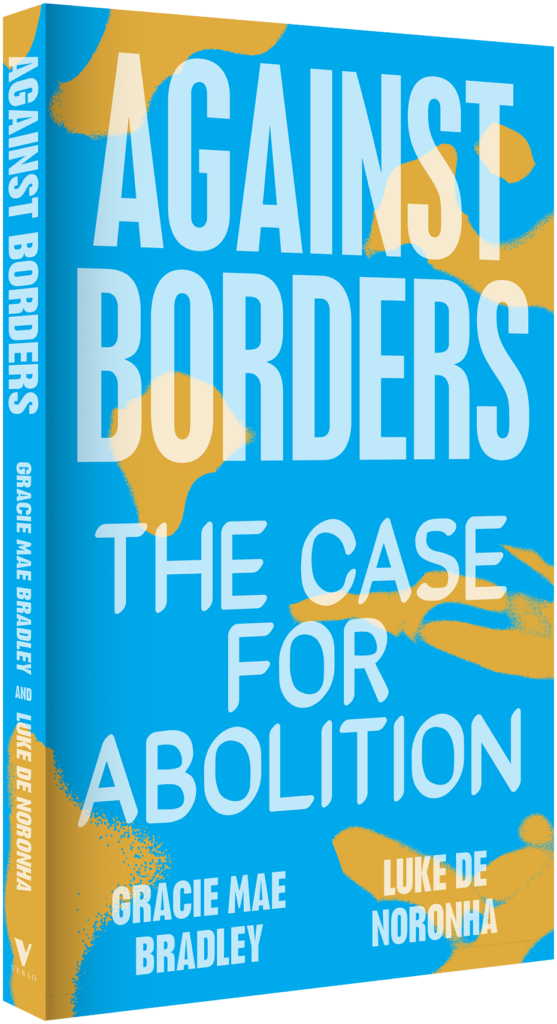Can we imagine a world without borders?
Migrants often face hardship at the border, yet the number of people making these journeys is increasing every year. A new book, ‘Against Borders’, explores how international borders are constructed and what a world without them would look like

There are many reasons why people migrate. They may be displaced due to conflict, droughts and famine, or they may face persecution or economic hardship at home. When they do move, they’re often met with violence and instability: beaten or assaulted as they make dangerous journeys, held in overcrowded detention camps for ‘processing’, forced to remain hidden from the state in a series of cash-in-hand jobs and then targeted in immigration raids. Yet for all these deterrents, more and more people are making these journeys across international borders every year. The United Nations Institute on Migration estimated that in 2021, around 84 million people had moved across borders over the previous 12 months. So if borders don’t really work in the way governments claim they do, the question is: who are they really for, why do we have them, and could we imagine a world without them?
Such questions animate Against Borders: The Case for Abolition, a new book by Gracie Mae Bradley and Luke de Noronha. In it, Bradley (a human rights campaigner and the former head of the civil rights campaign organisation Liberty) and de Noronha (who teaches on race and borders at University College London) explain how borders are constructed and the way that they permeate the lives of both migrants and non-migrants alike. Within the book, they consider alternatives to the border regime and its fundamental contradictions. “Borders both have an immense amount of power,” says de Noronha, “and don’t work very well at the same time.”
Each chapter of the book focuses on a particular feature of border systems. In one chapter on gender, Bradley and de Noronha explore how visa policies’ focus on families can harm migrant women who end up tied to abusive relationships; how sexuality is policed in asylum claims; and how trafficked women often end up on the sharp end of police stings that are meant to ‘save’ them. Bradley and de Noronha also discuss the tactics to resist borders altogether, though they’re quick to emphasise that Against Borders is not a guidebook. “There’s not one form of advocacy that’s most effective,” says Bradley. “If everybody’s firefighting, who’s prefiguring? If everybody’s kind of dreaming and doing kind of micro stuff, who’s got their eye on the government?”
Baseless fears and accusations of migrants contributing to declining living standards, anti-immigrant sentiment trotted out around election time by politicians to whip up division and win cheap votes , or breathless TV reports of how many people have made a dangerous journey over the Channel — all of these conditions contribute to the way that border policies are produced and enacted. To think about a world without borders would be to think about a world where the conditions that produce borders are changed. Such a political commitment would touch on areas as diverse as labour rights, gender and sexual equality, and racial equality. It would mean considering more closely how migrants are categorised, as the distinctions between ‘refugees’ and ‘asylum seekers’ are often based on outdated legal distinctions that don’t address the reality of an increasingly unstable world. It would require governments to reckon with the way that existing borders often arbitrarily carve up communities and groups of people into ‘deserving’ and ‘undeserving’, often within a country itself.

Theresa May’s ‘hostile environment’ policy is a salient example of this. As a result of the policies, introduced in 2012, more and more members of the public were mandated to enforce immigration policy. Despite the public outcry following the Windrush scandal, today bank workers still check people’s immigration status before they open an account, and doctors and nurses are actively encouraged to report people who they suspect of not being legalised migrants to the Home Office if they try to receive medical care. In turn, these punitive measures push people into immigration limbo, making people homeless or forcing them to live in fear of deportation. The hostile environment was not an aberration but simply a continuation of anti-immgration legislation in the UK that dated back to the 1905 Aliens Act, which made it more difficult for people to come and make lives in the UK, particularly if they weren’t seen as white. Over a century later, similar policies are still touted across the political spectrum.
Yet as much as these policies feel ingrained today, for a great deal of human history, borders didn’t really exist in the way that we recognise them. Nations weren’t necessarily always seen as fixed territories, and concepts of nationality were more reliant on the physical limits of how people could or couldn’t cross land or water (processes of colonisation and dispossession also had a significant role to play in this dynamic). Legislation that tried to restrict people’s movement was often based on limiting how people could move within a country, not from outside of it. In the last two centuries, what we now think of as ‘immigration control’ — formal legislation that tries to impose conditions on who can move freely — became more widespread in the global north, often as a response to people from the global south moving. These laws formalised immigration control (which often already existed in some form) and, in many places, explicitly discriminated against people from certain countries. In the early 1900s, for example, the Canadian government passed several pieces of legislation trying to cap the number of Chinese, Japanese, Indian, and Italian immigrants coming into the country, which was later watered down and absorbed into wider-reaching legislation.
These kinds of immigration controls have become entrenched in a particular kind of political thinking. Today, the idea of a world without borders may be one that feels too far off to even contemplate. Around the EU, solidarity with migrants is increasingly criminalised. In Poland, volunteers have been arrested and threatened with jail time for providing aid to families crossing the border; in Greece, volunteers have been accused of illegal smuggling; and in the UK, the Tory leadership race takes place in the backdrop of an authoritarian, right wing government that is continuing to decimate protections for marginalised groups. Home Secretary Priti Patel, whose own parents immigrated to the UK, recently announced plans to deport people arriving into the UK to Rwanda. While these plans were temporarily stymied by a combination of direct action and legal claims, all of the Tories scrambling to be prime minister emphasise their hardline credentials through their tough stances on immigration, making it unlikely that there would be any substantive change with a new cabinet or leader.
“Borders both have an immense amount of power, and don’t work very well at the same time”
— Luke de Noronha, co-author of ‘Against Borders’
What’s more, contemporary borders are highly digitised. Across the world, but particularly in the global North, information on individual migrants is stored in massive databases that are developed with tech companies like IBM and Amazon. Tech corporations like Palantir, which has built its business on surveilling migrants in the US and helping weapons manufacturers, often receive a lot of criticism, but companies that aren’t household names, such as HiFly (which charters deportation flights) also makes money through similar means. “The image of the detention centre as a space of physical incarceration or the person chained to the seat on the deportation flight, or the EU as a fortress, might not be the only image that we need to think through,” says de Noronha.
This isn’t just about databases that are used to surveil migrants, but also about facial recognition used against football fans in stadiums, or web crawling programs used against human rights activists — often, migrants and other vulnerable groups are viewed as a testing ground for new technologies, before being rolled out to the wider population. Often, these technologies are treated as inevitable. “Once these sets of practices are in place, these institutional arrangements for those technologies will be expanded,” explains Bradley. “But it’s also really interesting to look at digital infrastructures which have a different ethos, so thinking, what are the alternatives, thinking about who can build those technologies if they don’t already exist.”
In Against Borders, Bradley and de Noronha highlight a series of changes that could go some way towards making this future possible in the UK, if there was the political will. This includes ending visa conditions that tie immigration status to employment or to marriage, so that people can leave abusive relationships or work situations without fearing deportation, and strengthening union protections for migrant workers. “As we try to dismantle all the new stuff, it’s worth remembering that if we’re fighting to defend the status quo, that was completely inadequate,” says Bradley. “The status quo was the hostile environment. Before that, the status quo was deportation post-conviction, and before that, the status quo was the 1971 Immigration Act.”

The authors also discuss how the money currently spent on immigration enforcement could redistributed. Outside of the UK, states such as Ethiopia and the Niger receive funding from the EU Trust Fund for Africa on the basis that they attempt to deter their own nationals from migrating. As Mary Atkinson of the Joint Council for the Welfare of Immigrants detailed last year, the Home Office spent over £1.49 billion in 2019 alone, much of which went to private companies like G4S and Serco, who have been the subject of multiple public inquiries about the way that they treat detainees in detention centres and deportation flights. All the while, asylum seekers receive about £35 a week from the Home Office to live off, and are forbidden from taking on paid work (leading many to take on exploitative cash-in-hand jobs with few legal protections, which can also lead to them being targeted in immigration raids). Imagine what else that money could be used for: ambulances, improving access to clean air in local councils, more housing, paying teachers salaries, improving living conditions for vulnerable people, housing the homeless, community based justice initiatives, more public transport.
So where could a world without borders begin? Last year, crowds of people gathered outside Kenmure Street in Glasgow and refused to let police take their neighbours away. More recently, protesters chained themselves to the gates outside Derwentside Detention Centre, and people from Peckham, south east London, gathered to protect their neighbour from an immigration raid. Public outpourings of support for some groups of migrants, such as those fleeing from Afghanistan or Ukraine, indicate that there are ways to move the needle towards making that support less conditional. It’s worth considering that the uneven realities of borders are wielded through sheer luck — the only reason that someone is a citizen of the UK and someone else isn’t is an accident of birth, rather than an inherent virtue or choice.
“We often talk about how to find these cracks, the point of having an imagination, a longer term vision,” says de Noronha. “You’re not really expecting to turn those cracks or those pockets into whole territories in our lifetime, but you don’t know when they will become models for things that are much bigger.”
Against Borders: The Case for Abolition by Gracie Mae Bradley and Luke de Noronha is out now
